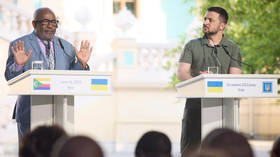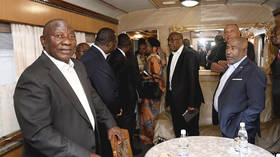The African Union mission got off to an inauspicious start in Warsaw, when Polish authorities held up Ramaphosa’s security detail. While in Kiev on Friday, the visitors were reportedly told to take shelter from incoming “Russian missiles.” Ukrainian authorities later claimed to have shot down six Russian hypersonic rockets. . .the delegation didn’t hear any explosions or see anything out of the ordinary.
The delegation, including leaders of Senegal, Egypt, Zambia, South Africa and the Comoros, met Zelenskyy after being greeted in Kyiv by a volley of Russian missiles.
Ukrainian President Vladimir Zelensky brushed off the African Union peace initiative on Friday, insisting there can be no negotiations with Russia. The high-ranking delegation of six heads of state, led by South African President Cyril Ramaphosa, visited Kiev before moving on to St. Petersburg.
“I have said clearly and many times during our meeting today that allowing any talks with Russia while the occupiers are still on our land means freezing the conflict, the pain and the suffering,” Zelensky said at the press conference afterward.
According to Zelensky, Russia “deceived” the world for years with the Minsk process and is trying to do so again. For peace to happen, he argued, “Russian troops need to leave our entire independent territory.”
The Franco-German proposal Ukraine had agreed to in 2015 was supposed to bring peace in the Donbass, but former German chancellor Angela Merkel admitted last year that its true intent was to buy time for NATO to arm Ukraine. Former French president Francois Hollande has confirmed Merkel’s account. Russian President Vladimir Putin reacted with disappointment, saying he believed for years that Berlin and Paris had been sincere.
- Zelensky also told reporters that Ukraine was greatly helping African nations with food security and setting up “grain hubs” on the continent “with our partners,” accusing Russia of using hunger and social instability as a tool of political pressure.
- The grain Kiev exported under the terms of the Black Sea Initiative, however, has mostly gone to the EU and ended up as animal feed. Meanwhile, the UN has failed to unblock the export of Russian food and fertilizer to Africa, which used to account for a far greater share of the continent’s needs.
The African Union mission got off to an inauspicious start in Warsaw, when Polish authorities held up Ramaphosa’s security detail. While in Kiev on Friday, the visitors were reportedly told to take shelter from incoming “Russian missiles.” Ukrainian authorities later claimed to have shot down six Russian hypersonic rockets.
“There's obviously some deliberate misinformation being spread here,” Ramaphosa’s spokesman Vincent Magwenya later told South African media, adding that the delegation didn’t hear any explosions or see anything out of the ordinary.
Zelensky has previously turned down the Vatican’s offer to mediate a ceasefire as well, telling the papal envoy Cardinal Matteo Zuppi earlier this month that he would only accept the terms of his own Ukrainian “peace formula.” The list of ten demands includes Russia’s withdrawal from all territories Kiev claims as its own, payment of reparations, war crimes trials and NATO membership for Ukraine. Moscow has dismissed it as delusional and said that any peace talks will be with Zelensky’s “masters” in the West, rather than their puppet.
Putin meets with African leaders in Russia to discuss Ukraine peace plan, but no visible progress
KYIV, Ukraine (AP) — Russian President Vladimir Putin on Saturday met with a group of leaders of African countries who traveled to Russia on a self-styled “peace mission” the day after they went to Ukraine, but the meeting ended with no visible progress.
The seven African leaders — the presidents of Comoros, Senegal, South Africa and Zambia, as well as Egypt’s prime minister and top envoys from the Republic of Congo and Uganda — visited Ukraine on Friday to try to help end the nearly 16-month-old war.
The African leaders then traveled to St. Petersburg on Saturday to meet with Putin who was attending Russia’s showpiece international economic forum.
Details about the delegation’s proposals were thin.
Foreign Minister Sergey Lavrov said after the three-hour meeting that the Africans’ peace plan consisted of 10 elements, but “was not formulated on paper.”
“The peace initiative proposed by African countries is very difficult to implement, difficult to compare positions,” Kremlin spokesman Dmitry Peskov said. But ”President Putin has shown interest in considering it.”
“He spoke about our position. Not all provisions can be correlated with the main elements of our position, but this does not mean that we do not need to continue working,” Peskov said.
“The main conclusion, in my opinion, from today’s conversation is that our partners from the African Union have shown an understanding of the true causes of the crisis that was created by the West, and have shown an understanding that it is necessary to get out of this situation on the basis of addressing these underlying causes,” Lavrov said.
Russia says that it was effectively forced to send troops into Ukraine because it was threatened by Ukraine’s desire to join NATO and by the country’s support from the United States and Western Europe.
Speaking at the economic forum on Friday, Putin declared that the first Russian tactical nuclear weapons have been deployed to Belarus, describing the move as a deterrent against Western efforts to defeat Russia in Ukraine. He previously said that the deployment would begin in July.
Asked if he could order the use of battlefield nuclear weapons in Ukraine, Putin said that there was no need for that but noted that Moscow could use its nuclear arsenals in case of a “threat to the Russian statehood.”
“In that case, we will certainly use all the means that the Russian state has. There should be no doubt about that,” he said.
The mission to Ukraine, the first of its kind by African leaders, comes in the wake of other peace initiatives — such as one by China — and carries particular importance for Africa, which relies on food and fertilizer deliveries from Russia and Ukraine. The war has impeded exports from one of the world’s most important breadbaskets.
“This conflict is affecting Africa negatively,” South African President Cyril Ramaphosa said at a news conference alongside Ukrainian President Volodymyr Zelenskyy and four other African leaders after their closed-door talks on Friday.
Ramaphosa and others acknowledged the intensity of the hostilities but insisted all wars must come to an end and emphasized their willingness to help expedite that.
“I do believe that Ukrainians feel that they must fight and not give up. The road to peace is very hard,” he said, adding that “there is a need to bring this conflict to an end sooner rather than later.”
The delegation, including Presidents Macky Sall of Senegal and Hakainde Hichilema of Zambia, represent a cross-section of African views on the war.
South Africa, Senegal and Uganda have avoided censuring Moscow over the conflict, while Egypt, Zambia and Comoros voted against Russia last year in a U.N. General Assembly resolution condemning Moscow’s invasion.
Many African nations have long had close ties with Moscow, dating back to the Cold War when the Soviet Union supported their anti-colonial struggles.
Speaking during Friday’s news conference, Comoros President Azali Assoumani floated the idea of a “road map” to peace, prompting questions from Zelenskyy who sought a clarification and insisted he didn’t want “any surprises” from their visit with Putin.
Chances for peace talks look dim as Ukraine and Russia take sharply different stands. Ukraine demands that Russia withdraws its troops from all its occupied territories as a condition for peace talks. The Kremlin, in turn, wants Ukraine to recognize the Crimean Peninsula, which Moscow illegally annexed from Ukraine in 2014, as part of Russia and acknowledge other land gains it has made.
China presented its own peace proposal at the end of February. Ukraine and its allies largely dismissed the plan, as the warring sides look no closer to a cease-fire.
The African peace mission comes as Ukraine launches a counteroffensive to dislodge the Kremlin’s forces from occupied areas, using Western-supplied advanced weapons in attacks in several sections of more than the 1,000-kilometer (600-mile) front line.
In the village of Blahodatne, taken by Ukrainian forces in the counteroffensive six days ago, soldiers said they have orders to keep advancing and not retreat, indicating long grueling battles ahead in the direction where Russians have built up dense lines of fortifications.
“Morale is really strong because the guys know they’re moving forward to liberate their lands,” said a Ukrainian soldier with the callsign Skripal (Violinist). “We have an order not to retreat and to move forward, so we’re trying.”
Village roads are punctured with craters, buildings
are caved in and bullet holes peppered nearly every residence. Inside a
cultural center, a Ukrainian commander with the call sign “Lermontov”
said that they’d captured many Russian soldiers during the liberation of
the village and showed journalists four bodies whom he said were
Russian fighters who had been recruited from prisons.
.jpg)
.jpg)



.webp)


No comments:
Post a Comment